
Christoph Wilhelm Friedrich Hufeland was a German physician, naturopath and writer. He is famous as the most eminent practical physician of his time in Germany and as the author of numerous works displaying extensive reading and a cultivated critical faculty.
Wartburgkreis is a Kreis (district) in the west of Thuringia, Germany. Neighboring districts are the districts Unstrut-Hainich-Kreis, Gotha, Schmalkalden-Meiningen, and the districts Fulda, Hersfeld-Rotenburg and Werra-Meißner-Kreis in Hesse. The district has 30 municipalities, including Eisenach.

Saxe-Weimar-Eisenach was a German state, created as a duchy in 1809 by the merger of the Ernestine duchies of Saxe-Weimar and Saxe-Eisenach, which had been in personal union since 1741. It was raised to a grand duchy in 1815 by resolution of the Congress of Vienna. In 1903, it officially changed its name to the Grand Duchy of Saxony, but this name was rarely used. The grand duchy came to an end in the German Revolution of 1918–19 with the other monarchies of the German Empire. It was succeeded by the Free State of Saxe-Weimar-Eisenach, which was merged into the new Free State of Thuringia two years later.
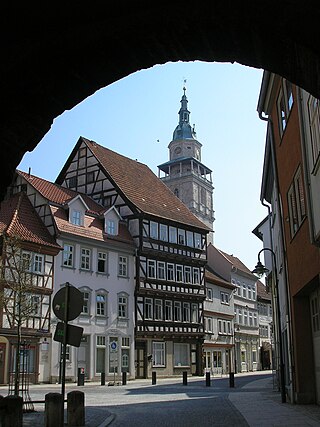
Bad Langensalza is a spa town of 17,500 inhabitants in the Unstrut-Hainich district, Thuringia, central Germany.

Hirschberg is a town in the Saale-Orla-Kreis district, in Thuringia, Germany. It is situated on the river Saale, 20 km south of Schleiz, 12 km northwest of Hof (Bavaria), and 25 km southwest of Plauen (Saxony).
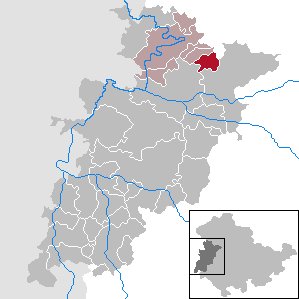
Berka vor dem Hainich is a municipality in the Wartburgkreis district of Thuringia, Germany.
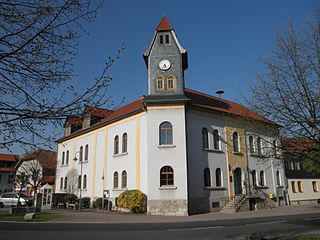
Großengottern is a village and a former municipality in the Unstrut-Hainich-Kreis district of Thuringia, Germany. Since 1 January 2019, it is part of the municipality of Unstrut-Hainich.

Westhausen is a municipality in the region Heldburger Land in the district of Hildburghausen, in Thuringia, Germany.

Schweickershausen is a municipality in the region Heldburger Land in the district of Hildburghausen, in Thuringia, Germany.

Kaulsdorf is a municipality in the district Saalfeld-Rudolstadt, in Thuringia, Germany.
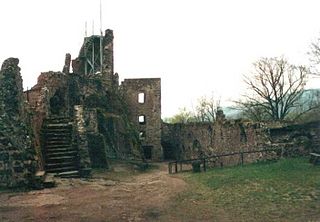
Hohnstein Castle is one of the largest and best-preserved castle ruins in Germany and is located near Neustadt in the vicinity of Nordhausen in Thuringia.

The Weimar–Gera railway is a line in the German state of Thuringia, connecting the city of Weimar via Jena, Stadtroda and Hermsdorf to Gera. It was built by the Weimar-Gera Railway Company, which was founded in June 1872, and the line was officially accepted into operation in June 1876.
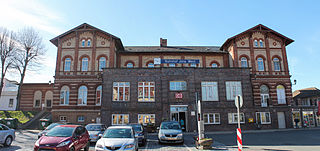
Jena West station is to the west of the centre of the city of Jena in the German state of Thuringia at the 22.59 km mark of the Weimar–Gera railway between Weimar, Jena-Göschwitz station and Gera Hauptbahnhof. This line is also called the Holzland Railway and it is part of the Mid-German Connection. The station is located in the suburb of Jena-Süd.

Jena-Göschwitz station is a railway station in city of Jena in the German state of Thuringia. It is located 152.21 metres above sea level, 32.22 km from Großheringen on the Saal Railway and 27.50 from Weimar station on the Weimar–Gera railway. It opened on 1 July 1876 and is classified by Deutsche Bahn as a category 4 station.

Hainich National Park, founded on December 31, 1997, is the 13th national park in Germany and the only one in Thuringia. One of the main objectives of the park is the protection of an ancient native beech forest. In 2011, the park was added to the Ancient and Primeval Beech Forests of the Carpathians and Other Regions of Europe World Heritage Site because of its testimony to the ecological history of the beech tree and the dynamics of forests in Europe since the Last Glacial Period.

Karl August Bleibtreu was a German writer who promoted naturalism in German literature. He was noted for his aggressive and dogmatic style of criticism, linked to a nationalistic and sometimes antisemitic agenda. His later work was heavily influenced by Nietzsche's theory of the übermensch.

Anna of Saxony, was a Duchess of Saxe-Coburg-Eisenach by marriage to John Casimir, Duke of Saxe-Coburg-Eisenach.
The Brabant Road, Cologne to Leipzig Road or Liege Road is an ancient road which, during the Middle Ages and Early Modern Period, was one of the most important continental east-west oriented military and trade routes. It ran from the eponymous Duchy of Brabant to Leipzig.

Windeberg is a village and quarter of the town of Mühlhausen in Thuringia, central Germany.

Großwelsbach is a village and an Ortsteil (part) of the town of Bad Langensalza in Thuringia, central Germany, with about 250 inhabitants.


















